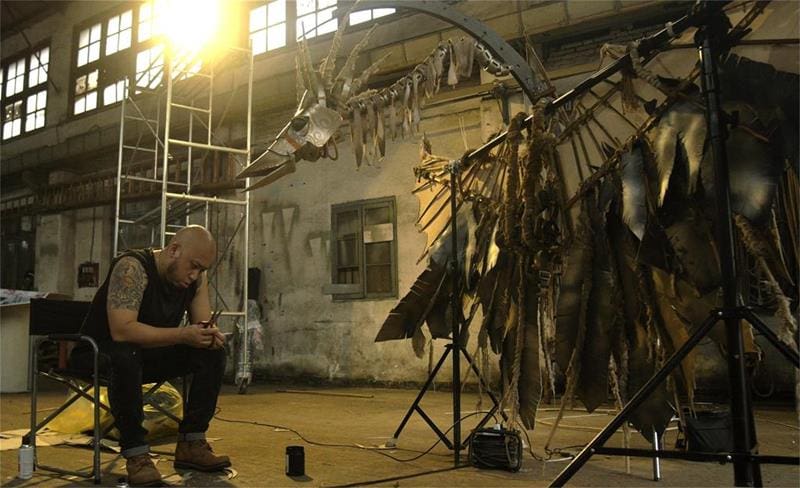
At first blush, co-directors Yang Sun and S. Leo Chiang’s new documentary, Our Time Machine, which premiered at Tribeca this afternoon, seems pretty straightforward. Filmed over a number of years, it follows Chinese artist, Maleonn, as he develops a new puppet-driven play called “Papa’s Time Machine” as a way to honor his father, Ma Ke, after he’s diagnosed with Alzheimer’s. While the film is at least in part about telling that story, it’s also a thought-provoking, melancholy portrait of creativity and growing up that’s hard to shake.
When we first meet Maleonn, he’s a hopeless bachelor so devoted to his work (which includes puppets, surreal photography and a half-dozen other mediums) that he fears he’ll never marry. As it turns out, he shares that work ethic with his father. Both involved in traditional Chinese Opera, Ma Ke and his wife, Zheng Wei Tong, were forced to work on a cotton farm during the 10 years of China’s Cultural Revolution and he wanted to make up for lost time once he was allowed to work again. As Ma Ke says repeatedly throughout the film, the fact that he put on dozens of operas as the artistic director of the Shanghai Chinese Opera Theater is part of what makes his memory problems so frustrating—particularly as he struggles to write his memoirs before he forgets.
By the same token, Maleonn is desperate to finish his play in time for his father to see it and that struggle gives the film its urgency. As Maleonn explains, though his earliest memories of his father can be characterized as, “he only spoke to me to punish me.” Maleonn was impressed by his father’s work nonetheless and hopes to use the play to fulfill his long-held dream of collaborating with his father. At first, it seems like following the creation of the play will be the film’s main focus. However, while we see early puppet-building meetings, Maleonn striving to find financing and even sections of the finished play, the actual creative work increasingly takes a back seat to the far more compelling personal drama.
Sun and Chiang clearly have incredible access to the lives of Maleonn and his family and the more we get to know them, the more difficult it is to watch them cope with Ma Ke’s deterioration. While scenes where Ma Ke first declines to work with Maleonn and then, after he finally accepts, is forced to leave the production when his condition worsens are heart-breaking, it’s the scenes that are totally unrelated to the play that pack the biggest punch.
Perhaps the most striking comes when Sun and Chiang film Maleonn’s parents at home on their own. Where Ma Ke once recited his resume with the Shanghai Opera in frustration, his tone turns aggressive as his condition worsens and it’s upsetting to watch his wife cry as she takes the brunt of that rant. The sadness only increases when Maleonn shows up in the next scene and his mother breaks down as she explains she can’t wait any longer for her son’s work to slow down enough to focus on them. It’s a tough moment, but it’s impressive to see such a frank and open discussion of how difficult aging and illness is on everyone in a family.
However, while Our Time Machine’s frankness is what makes it so effective a portrait of one man coming to terms with his parents’ and therefore his own mortality, that willingness to focus on the tough parts will certainly alienate some viewers. While the aforementioned scene is tough, the worst by far is the moment we see Sun and Chiang remind Ma Ke that not only has Maleonn finished his play, but his father saw it on opening night. As Ma Ke hears the news, we see him register shock, disappointment at forgetting and then ask the directors whether the play was good. It’s a brutal moment only made more heartbreaking by the fact that he will inevitably forget again and re-experience those emotions countless times. Not all viewers will be open to being brought to such a melancholy, contemplative place.
Though Our Time Machine is technically a documentary about an artist honoring his father by staging a play about their relationship, it’s also a thoughtful exploration of memory and growing up. Yes, it can be a tough watch, but what makes it so powerful is that it understands that life can be both good and bad in the same moment. Throughout, the film calls back to Maleonn’s story about the first time he realized his father’s memory was failing. As his father watched him swim on day, each time he reached his father while doing laps, Ma Ke would ask him if he taught him to float, forgetting the exchange each time. The story is emblematic of everything Ma Ke’s illness takes from him, but even that condition takes on a different meaning by the end. As Maleonn explains it, while repeatedly introducing his father to his own granddaughter was initially painful, seeing his father’s joy at each introduction is beautiful too.

